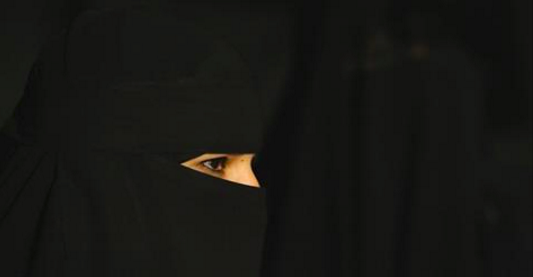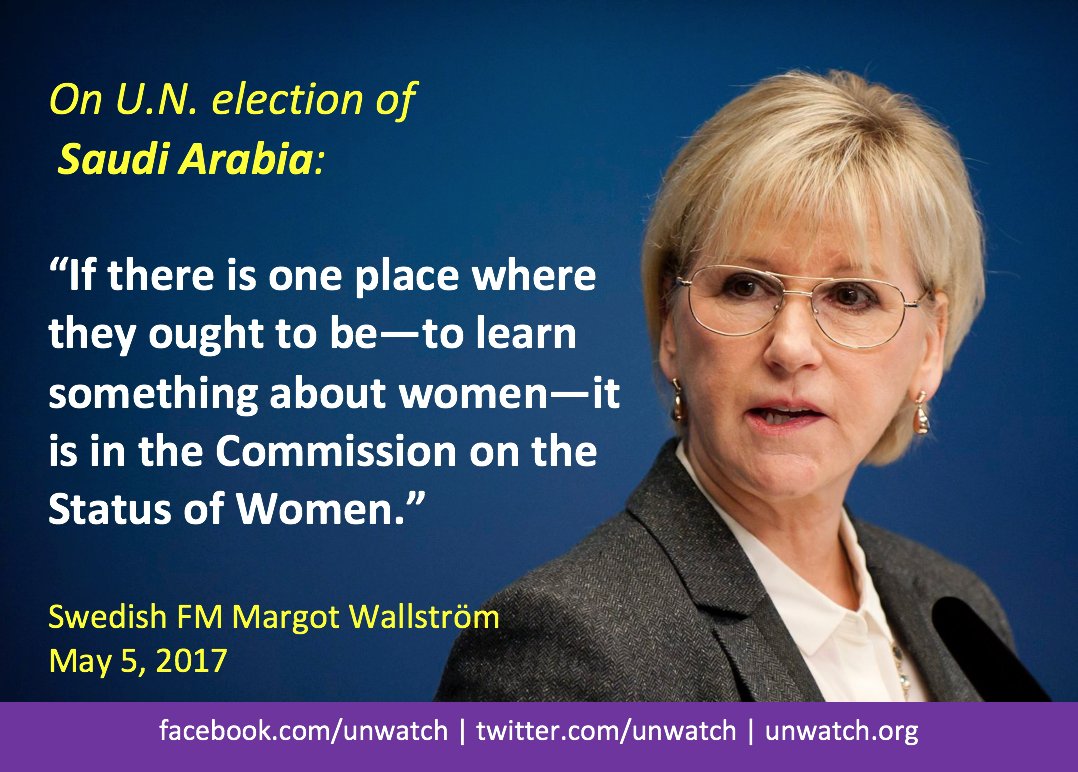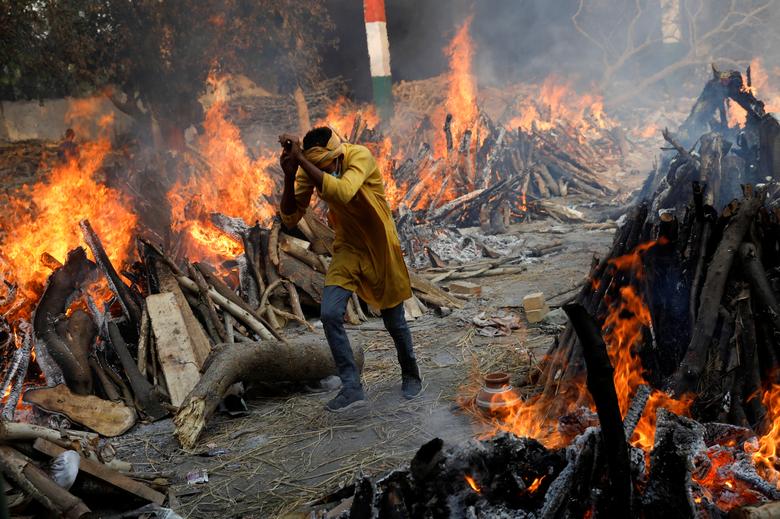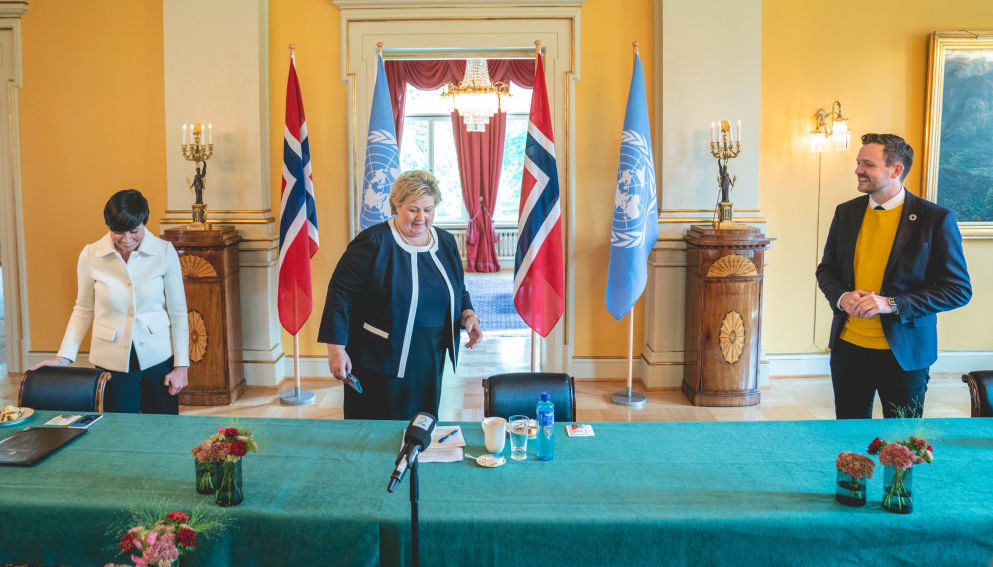
UN Watch’s exposure of the UN’s absurd election of Saudi Arabia, the world’s worst abuser of women’s rights, to the Commission on the Status of Women, has caught the world’s attention and sparked contentious debates in parliaments worldwide.
The story has been reported by major news outlets, including:
- New York Times: In ‘absurd’ move, Saudi Arabia elected to U.N. women’s commission
- Newsweek: Widespread Criticism Follows Saudi Arabia Joining UN Women’s Rights Group
- CNN: Saudi Arabia’s election to UN women’s commission draws ire
- The Chicago Tribune: Listing quote from Hillel Neuer as one of two top quotes of the day
Many more news stories worldwide listed here.
Timeline
April 19, 2017 – the UN Economic and Social Council issues press release announcing Saudi Arabia’s election to the Commission on the Status of Women.
April 22, 2017 – UN Watch publishes statement on its website condemning election of Saudi Arabia to Commission on the Status of Women: No Joke: UN Elects Saudi Arabia to Women’s Rights Commission.
April 23, 2017 – UN Watch begin posting about the election on Facebook and Twitter. The story quickly goes viral. The initial Facebook post has almost 10,000 shares. The initial tweet is retweeted more than 1,000 times. Hillel Neuer’s April 23, 2017 Tweet “At least 5 EU states voted FOR the Saudis” is retweeted 880 times and quoted extensively by the news media.
April 24, 2017 – Major media outlets publish stories about the absurd election: New York Times, Newsweek, Fox News, National Review, Huffington Post Canada, Germany’s Bild, France’s i24 News, and many others. UN Watch’s Hillel Neuer is interviewed on Israel’s i24News English. The interview has 30,000 views on Facebook.
April 25, 2017 – UN Watch’s Hillel Neuer is interviewed on France24. Outraged parliamentarians around the world begin to speak out and question their governments.
NORWAY
In Norway, the story was published extensively in the media between April 24 and 26, 2017 and the issue led to a heated debate between parliamentarians and the government:
- Aftenposten, Norway’s largest printed newspaper, published a major story quoting UN Watch’s Hillel Neuer: “Electing Saudi Arabia to protect women’s rights is like making an arsonist into the town fire chief.”
- NRK, Norway’s largest media organization also quoted Hillel Neuer extensively: “Saudi discrimination against women is gross and systematic in law and in practice.” In addition NRK radio broadcast a segment on the story, interviewing Hillel Neuer along with Norwegian parliamentarians and government officials.
- Norway’s edition of The Local, a source for English language digital news in countries across Europe, quoted UN Watch’s Hillel Neuer extensively: “why did the U.N. choose the world’s leading oppressor of women to promote gender equality and the empowerment of women?”
- NewsinEnglish.no, another online Norwegian English language publication noted: “The issue brought rare agreement between SV on the far left of Norwegian politics and the progress party on the far right.”
- On April 26, 2017, members of Norway’s parliament on both sides, including Liberal leader Trine Skei Grande, Christian Democrat Knut Arild Hareide and Socialist Left party leader Audun Lysbakken, demanded to know how Norway voted. They raised the issue in parliament. Grande said: “I think it is important to be open about how Norway votes internationally. This is an alarming enough result for there to be good reason to make [the Norwegian vote] public.” Hareide said: “We probably can’t stop them from being voted in, but Norway should not have supported it and we ought to be clear about what we have done.”
- On April 26, 2017, the government responded: “Norway won’t make public how we vote in secret UN elections,” said Foreign Minister Børge Brende; “Voting in connection with UN candidatures within the UN is not public,” said Frode O. Andersen, Foreign Ministry Head of Communications.
SWEDEN
Similarly, in Sweden, the media published the story between April 24 and 25, 2017, reporting that Swedish parliamentarians challenged their government on its vote:
- Göteborgs-Posten, a major daily Swedish newspaper, quoted UN Watch’s Hillel Neuer: “Electing Saudi Arabia to protect women’s rights is like making an arsonist into the town fire chief.”
- Expressen, a widely distributed evening tabloid also quoted Hillel Neuer: “At least 5 EU states voted FOR the Saudis.”
- Borås Tidning, another Swedish daily quoted Hillel Neuer: “It is entirely up to the Swedish government to tell its citizens how it voted.”
- The online magazine OmVärlden also quoted Hillel Neuer in its story.
- Swedish parliamentarians demanded answers. On April 25, 2017, Swedish MP Sofia Arkelsten, member of the Foreign Affairs Committee, submitted a written question to the government and Jan Björklund, Chairman of the Liberal Democratic Party, also called for an explanation: “I hope it is not true that Sweden has voted Saudi Arabia to the UN Women Commission.”
- On April 25, 2017, the government responds:
- Prime Minister Stefan Löfven: “check with the Foreign Ministry”
- Foreign Minister Margot Wallström wrote on Facebook: “The decision on how Sweden would act in the vote for the Women’s Commission last week was not something that was decided at the political level,” and stated that the government would reveal how it voted to the Foreign Policy Committee whose meetings are confidential.
- Minister of Gender Equality Åsa Regnér said: “The UN is an organization of member states where everyone has an equal right to participate in the work of the organization.”
- May 5, 2017: Swedish foreign minister Margot Wallström defends the election of Saudi Arabia, saying: Swedish FM Margot Wallstrom was asked about the election of Saudi Arabia to the UN women’s rights commission. Her response (May 6, 2017): “In the Commission of the Status of Women are almost one fourth of all the countries in this world: there is also Russia, Belarus, Iran, Pakistan. And if we would have as a criteria that they have an ambitious policy when it comes to women’s rights, very few countries would actually take place there. If there is one place where they ought to be, to learn something about women, it is in the Commission on the Status of Women. If it was about the policies that they have at home, maybe only Finland and Sweden would be left in the Commission of the Status of Women. I don’t think it would be a good idea.”
DENMARK
Denmark, though not a member of the UN Economic and Social Council that voted Saudi Arabia onto the Women’s Commission, covered the issue critically in its news outlets on April 25 and 26, 2017:
- Jyllands-Posten International, one of Denmark’s largest selling newspapers, referenced UN Watch’s statistics on how many EU countries voted for Saudi Arabia.
- Politiken, a leading Danish newspaper, quoted Hillel Neuer: “Electing Saudi Arabia to protect women’s rights is like making an arsonist into the town fire chief.”
- Kristelight Dagblad, another Danish daily quoted Hillel Neuer: “Why did the UN choose the world’s leading oppressor of women to promote gender equality?”
- Danish politician Jakob Engel Schmidt, spokesman for the governing Liberal party called the vote “deeply bizarre.”
BELGIUM
In Belgium, the story broke on April 24, 2017 and is still generating headlines. Politicians on all sides were highly critical of the government’s apparent ‘yes’ vote, forcing a public apology from the Prime Minister.
- La Libre, a widely circulated Belgian French daily, published the story quoting UN Watch’s Hillel Neuer: “petro-dollars make it possible to buy everything, even a political profit.”
- Le Soir, Belgium’s other main French daily, also quoted Hillel Neuer in its story.
- De Standaard, Belgium’s main Flemish daily accused the Belgian government of having voted to elect Saudi Arabia and quoted UN Watch’s statement that five European countries had to have voted for Saudi Arabia in order for it to get elected.
- The Belgian news agency Belga, headlined its story: “Belgium has probably supported the accession of Saudi Arabia to the UN committee on the Rights of Women.”
- Belgian politicians castigated the government. On April 26, 2017, Belgian MP Wouter de Vriendt asked a parliamentary question about Belgium’s vote and said: “A positive vote from Belgium is simply shocking.” Els Van Hoof of the Christian Democrats said that defending a ‘yes’ vote is equivalent to admitting a vote for the misogynistic regime. Yasmine Kherbache of the Socialist Party accused the government of legitimizing “a regime that violates women’s rights every day.”
- On April 26, 2017, the government responds: Foreign Minister Didier Reynders issued a contradictory statement about the vote. He refused to confirm how Belgium voted, but justified the election of Saudi Arabia on multiple grounds. He said: “I strongly support multilateral meetings… including with countries with which we do not share the same opinions” and “Not entering into a debate with countries with which we do not agree within multilateral organizations involves a tremendous risk.” He also defended the decision on pragmatic grounds, suggesting that the election should have proceeded, as usual, without a vote in this type of situation where Saudi Arabia was running unopposed because “Western countries are far from holding a majority at the UN, and this may end up making it so that we are no longer elected to organizations of this type.” At the same time, he expressed that “Belgium is in no way pleased with the election of Saudi Arabia onto this commission.” Deputy Prime Minister Alexander de Croo did not disclose Belgium’s vote, but appeared surprised and said that he would not have voted in favor of Saudi Arabia.
- On April 27, 2017, the government took a different tone. Prime Minister Charles Michel said he regretted the vote and that: “If we could do it again and if it was possible to proceed with a political assessment at the government level, I of course would have pleaded against a favorable vote.” He also reportedly called for the resignation of Foreign Minister Reynders over his handling of the matter. For his part, Foreign Minister Reynders said that he wants to change Belgium’s procedure for voting for candidates at the UN.
See:
- Leaked e-mails: Belgium made sure Saudis knew it voted regime onto U.N. women’s rights commission
- Belgian FM defends election of Saudi Arabia to U.N. women’s rights body, advocates ‘dialogue’
- Belgium’s Shame: PM “sorry” for helping get Saudi Arabia on UN women’s rights panel; scandal exposed by UN Watch
UK
As of April 29, 2017, after the Belgian Prime Minister apologized, the UK Foreign Office still refused to disclose how it voted, as reported by The Independent.
AUSTRALIA
In Australia, the government also dodged the question, as reported in the news on April 25 and 26, 2017.
- The New Daily, a major source for online news in Australia, quoted extensively from UN Watch’s online statement about the absurdity of the vote. The article also quoted a separate statement from Hillel Neuer: “Australia is not responsible for the fact that the Asian group put up no other candidates, but it could and should have voted against Saudi Arabia, and should have convinced its allies to do the same.”
- Australia Broadcasting Corporation, Australia’s national public broadcaster, also published the story noting that former New Zealand Prime Minister Helen Clark responded to UN Watch’s Hillel Neuer on Twitter defending the vote: “It’s important to support those in the country who are working for change for women,” she said.
- The government responds: A spokeswoman for the Department of Foreign Affairs and Trade refused to disclose Australia’s vote, saying: “Places on the Commission on the Status of Women are allocated according to regional groupings.”
SAUDI REGIME REACTS
On April 26, 2017, Saudi Arabia went on the defensive in responding to the media and political maelstrom:
- In an Op-ed by the Saudi Ambassador to Norway published in NRK, Norway’s largest media outlet: “Saudi women are not oppressed. It’s not Norway’s problem that Saudi women cannot drive.”
- The Saudi Arabian government’s Bureau of International Communication and Media took to its twitter account, which it had used only sporadically before, with several tweets attacking France 24’s news coverage, claiming France 24 got the facts about Saudi women’s rights wrong.





